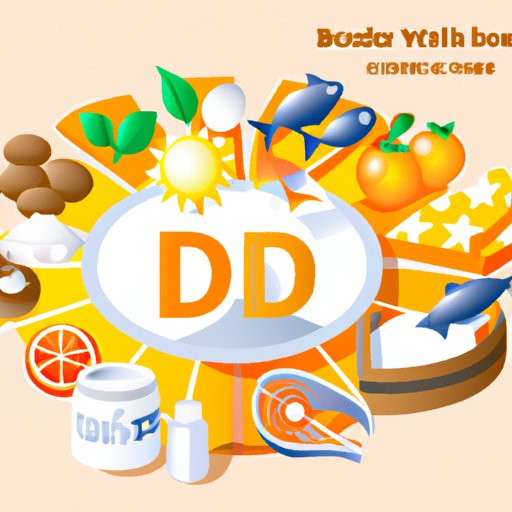Introduction
Vitamin D is an essential nutrient with many health benefits. It helps regulate calcium and phosphorus levels in the body, which are important for bone health. Vitamin D also helps protect against chronic diseases like cancer and diabetes, boosts immunity, and supports mental health. Knowing what foods contain vitamin D can help you make sure you’re getting enough of this crucial nutrient.

The Top Sources of Vitamin D
There are several food sources of vitamin D. The most common sources include dairy products, seafood, and fortified foods. Here’s a closer look at each one:
Dairy Products
Dairy products such as milk, yogurt, cheese, and butter are some of the best sources of vitamin D. Most of these products are fortified with vitamin D, meaning that additional amounts of the nutrient are added during processing. This helps ensure that people get an adequate amount of vitamin D from their diets.
Seafood
Seafood is another excellent source of vitamin D. Fish such as salmon, mackerel, tuna, and sardines are high in vitamin D. Additionally, oysters, shrimp, and other shellfish are good sources of the nutrient. Eating a variety of seafood can help you get enough vitamin D in your diet.
Fortified Foods
In addition to dairy and seafood, several other foods are fortified with vitamin D. These include breakfast cereals, orange juice, and some plant-based milks. Look for products that are labeled “fortified with vitamin D” to make sure you’re getting enough of the nutrient.
A Comprehensive Guide to Vitamin D
In addition to fortified foods, there are several natural food sources of vitamin D. Here’s a comprehensive guide to the different types of food that contain vitamin D:
Natural Food Sources
Natural food sources of vitamin D include mushrooms, egg yolks, and certain types of fish. For example, wild-caught salmon, herring, and mackerel are all good sources of vitamin D. Some plant-based foods, such as soybeans, are also good sources of the nutrient.
Supplements
If you’re not getting enough vitamin D from your diet, you may want to consider taking a supplement. Vitamin D supplements come in several forms, including tablets, capsules, and liquids. Talk to your doctor before starting any new supplement to make sure that it’s right for you.

Eating for Optimal Vitamin D
In addition to eating foods that contain vitamin D, there are several other steps you can take to make sure you’re getting enough of the nutrient. Here are a few tips for optimizing your vitamin D intake:
Whole Grains
Whole grains are a great source of vitamin D. Choose whole grain breads and pastas, oatmeal, and quinoa for a nutritious and vitamin D-rich meal. Whole grains are also high in fiber, which can help support digestive health.
Fruits and Vegetables
Fruits and vegetables are packed with vitamins and minerals, including vitamin D. Aim to eat a variety of colorful fruits and veggies every day to get enough of this essential nutrient. Citrus fruits, leafy greens, and cruciferous vegetables are all rich in vitamin D.
Nuts and Legumes
Nuts and legumes are also good sources of vitamin D. Try adding almonds, peanuts, lentils, and beans to your meals for an extra boost of vitamin D. These foods are also high in protein, making them a great choice for vegetarians and vegans.
Maximizing Vitamin D Intake
In addition to eating foods that contain vitamin D, there are several other steps you can take to maximize your intake of the nutrient. Here are a few tips to help you get the most out of your vitamin D:
Tracking Vitamin D Intake
Keeping track of how much vitamin D you’re getting each day can help you make sure you’re getting enough of the nutrient. Use a food tracker app or website to log your meals and snacks and calculate your daily vitamin D intake.
Balancing Vitamin D with Other Nutrients
It’s important to balance your vitamin D intake with other nutrients. Make sure you’re getting enough calcium, magnesium, and phosphorus, which are all important for bone health. Additionally, eating a balanced diet with plenty of fruits, vegetables, and lean proteins will help you achieve optimal nutrition.
Conclusion
Vitamin D is an essential nutrient with numerous health benefits. Knowing what foods contain vitamin D can help you make sure you’re getting enough of this important nutrient. Dairy products, seafood, and fortified foods are some of the best sources of vitamin D. Additionally, there are several natural food sources and supplements that can help you reach your daily vitamin D requirements. Finally, tracking your intake and balancing your vitamin D with other nutrients can help you maximize the benefits of this essential nutrient.


